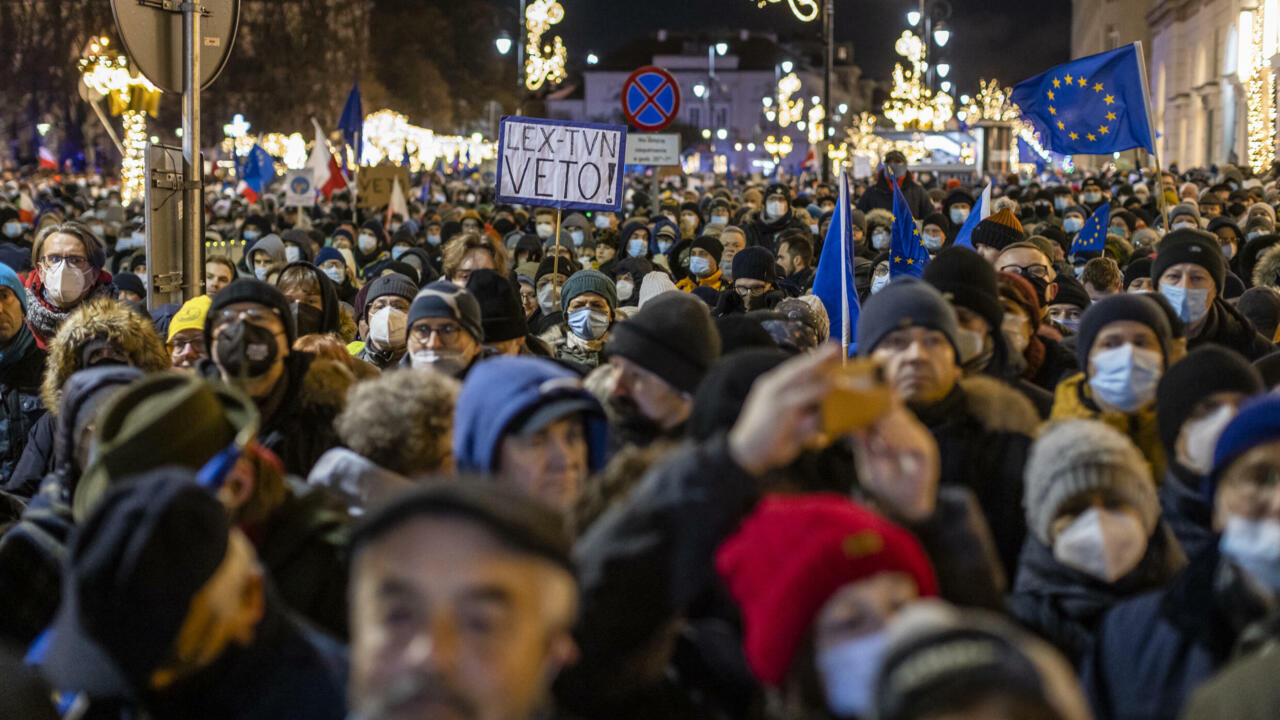"I refuse to sign the amendment on radio and television and send it back to Parliament for further consideration. This means that I am vetoing it," Duda said on Monday in a television ad, which followed strong American and European criticism.
The text, adopted by the Polish parliament on December 17 and wanted by the populist PiS (Law and Justice) party in power, was intended to prevent companies not belonging to the European Economic Area (EEA, which includes the 27 states of the 'EU, Iceland, Liechtenstein and Norway) to hold majority stake in Polish media companies.
This was to force the American group Discovery to sell its stake in TVN, one of the largest private television networks in Poland.
TVN24 is his 24-hour news channel, considered critical of the ruling conservatives.
The government for its part affirmed that the law should protect the Polish media landscape against potentially hostile actors, such as Russia.
Polish President Andrzej Duda in Budapest, November 29, 2021 ATTILA KISBENEDEK AFP / Archives
Duda said he remained true to this principle, but the law should not undermine existing investments or go against international agreements.
“The people I spoke to are concerned about this situation. They have different arguments. They spoke of peace and quiet… We don't need a new conflict, a new problem. We have already a lot of problems, "said the president.
"Lobby"
The Polish president has the backing of the ruling PiS party, but has had some differences with its leaders in the past.
In 2017, he stirred up a storm by vetoing two judicial reforms that he said gave too much power to the Attorney General, who is also the Minister of Justice.
The American charge d'affaires in Warsaw, Bix Aliu, thanked Mr. Duda "for his commitment to democratic values and to the defense of the investment climate in Poland".
He had previously asked the Polish president to block the law on the media, stressing that Washington was "extremely disappointed" by the adoption of this text.
A spokesperson for the European Commission underlined that this law presented "serious risks for the freedom and pluralism of the media in Poland".
TVN welcomed the announcement, welcoming the Polish president's choice of "good relations with the United States".
Thousands of people demonstrated on December 19 outside the Presidency in Warsaw and elsewhere in the country, waving EU flags and chanting "Free Media!"
and "We want a veto!".
Former Polish Prime Minister and former European Council President Donald Tusk, who heads the opposition Civic Platform party, said President Duda's decision showed that "pushing makes sense".
Former President of the European Council Donald Tusk, now head of a Polish opposition party, during a demonstration against a media law on December 19, 2021 in Warsaw Wojtek RADWANSKI AFP / Archives
The PiS already controls public television TVP, which has become a major asset of the populist government, and most of the regional press.
Paris-based NGO Reporters Without Borders hailed "good news for press freedom, which is in dire straits in Poland"
Since the PiS came to power in 2015, Poland has fallen 46 places in RSF's press freedom rankings to 64.
Poland and the EU have also been engaged in a standoff for several years over the judicial reforms launched by the PiS since 2015.
Brussels last week launched infringement proceedings against Warsaw following rulings by the Polish Constitutional Court challenging the rule of European law and the authority of the EU Court of Justice.
© 2021 AFP

